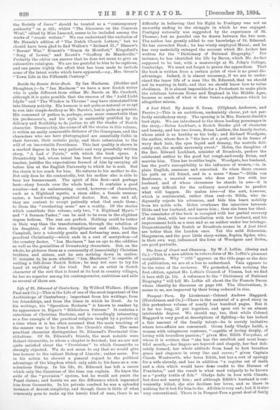Beside the Bonnie Brier-Bush. By Ian Maclaren. (Hodder and Stoughton.)—In
"Ian Maclaren " we have a new Scotch writer who is quite different from either Mr. Barrie or Mr. Crockett, although it is quite possible that the success of the "Auld Licht Idylls" and "The Window in Thrums" may have stimulated him into literary activity. His humour is not quite so natural or so apt to run into simple drollery as Mr. Barrie's, but is quite as genuine. His command of pathos is, perhaps, even more remarkable than his predecessor's, and his style is eminently qualified by its delicaey and flexibility to do justice to all the shades of Scotch character. Drumtochty, the scene of all the stories in this volume, is within an easily measurable distance of the Grampians, and the characters who are here photographed are essentially Celtic in their fervour, their ecstatic piety, and their submission to the will of an inscrutable Providence. This last quality is shown in a marked degree in the very pathetic and very gracefully written story, "A Lad o' Pairts," with which the book opens. A Drumtochty lad, whose talent has been first recognised by his teacher, justifies the expectations formed of him by carrying all before him at the English University to which he is sent. But the strain is too much for him. He returns to his mother to die. Not only does he die contentedly, but his mother also is able to bear her bereavement. The spirit of this first—and perhaps best—story broods over the whole book. It contains a good number—not an embarrassing crowd, however—of characters, such as a Highland mystic, a stern elder, a female sermon- taster, a hard-working, practical doctor. But, one and all, they are content to accept patiently what God sends them; to them the "everlasting arms" are a reality. Of the stories which constitute this volume, only two, "A Highland Mystic" and "A Sermon-Taster," can be said to be even in the slightest degree tedious. The rest are perfect. Nothing could be better in their way than the transformation, through the rebellion of his daughter, of the stern disciplinarian and elder, Lachlan Campbell, into a tolerably gentle and forbearing man, and the practical Christianity—which ends in a sort of martyrdom—of the country doctor, "Ian Maclaren " has an eye to the oddities as well as the genialities of Drumtochty characters. But, on the whole, he pictures them as a community of (essentially) Christian brothers and sisters, and he sets nothing down in malice. It remains to be seen whether "ran M.aolaren " is capable of writing a full-dress Scotch fiction ; he may not care to try his hand at anything of the kind. But as an artist in Scotch character of the sort that is found at its best in country villages, he has no superior among his contemporaries, ambitious and able as several of these are.


































 Previous page
Previous page